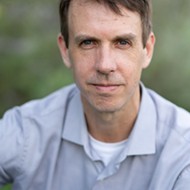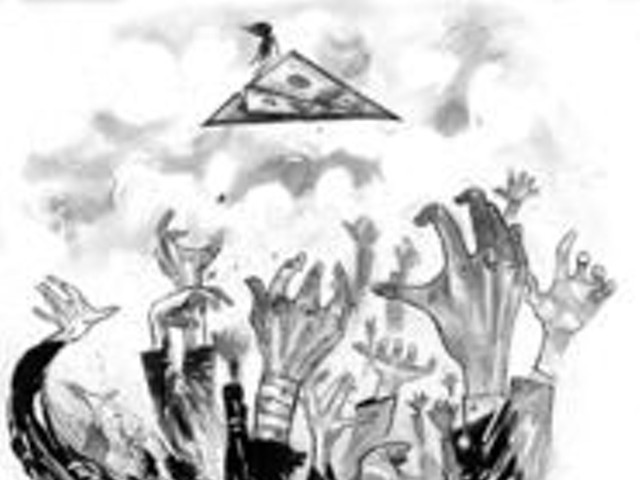Since retiring from his Collinsville law practice four years earlier, the 65-year-old Katz enthusiastically pursued cycling. He rode locally and nationally with a number of biking clubs, including the Turtles — so named because they don't go very fast — and BABES, the Belleville Area Bicycling and Eating Society.
Another of Katz's great passions was his faith. The conservative Jew made certain to attend early-morning prayer sessions several times a week, so that his fellow congregants could achieve minyan, the required quorum for Jewish worship.
On that fateful Monday, Katz never arrived at temple. He was struck down by a Ford F-150 pickup truck on Olive Boulevard, a few miles from his home in Creve Coeur. Suffering broken ribs, a broken vertebra and two collapsed lungs, he was pronounced dead that afternoon at St. John's Mercy Medical Center.
The driver of the truck, 27-year-old Robert Rush of Robertsville, Missouri, told police that he had been feeling drowsy before the collision. He accidentally hit Katz, he said, because he'd momentarily taken his eyes off the road.
"My neck was sore from the day before," Rush said in his statement. "I rubbed my neck, thinking what a long day was still ahead of me. I looked down to see Mr. Katz in my lane, about twelve feet in front of my truck."
St. Louis County Prosecutor Bob McCullouch declined to press criminal charges. Instead, Rush was charged with driving with a suspended license — for speeding and other moving violations — and with failure to keep a proper lookout.
Last month, on August 30, Rush pled guilty to the charges and received five weekends in jail, a sentence known as "shock probation," designed to scare new offenders straight. Should he violate the terms of his parole, he will be jailed for a year. Rush could not be reached for comment for this article.
Outside the Creve Coeur courthouse that August evening, about a dozen people gathered to protest what they felt was an extremely lenient punishment. Organized by the St. Louis Regional Bicycle Federation, the group wore white T-shirts that said "I Am Michael Katz" in black letters. One member held a sign that read, "Failure to keep a proper lookout + Dead Cyclist = Manslaughter."
"We felt that the decision that the county prosecutor has made not to pursue a charge of negligent homicide in this case is typical of a prevailing attitude, that inattention on the part of motorists is excusable," says Russ Willis, a member of the Bicycle Federation's board of directors. "Cyclists do have a right to be on the road, essentially the same rights as motor vehicles, the way they're described in the state statutes."
"At the risk of sounding like Matlock," says past federation chairman Bob Foster, "it seems to me that if you admit you weren't paying attention, and someone is dead, why isn't this negligent homicide? It seems the punishment doesn't seem to fit the crime and that there's no real consequences for careless and inattentive driving."
"When someone's driver's license has been suspended, there does not seem to be a mechanism to enforce the suspension, such as an ankle bracelet," says Susan Katz, Michael's widow. "Had this guy not been out on the road, he wouldn't have killed anybody."
The past year has been particularly brutal for St. Louis-area bicyclists. In June, Jeremy Rowlatt of Ballwin was killed when his bike was hit by a pickup truck on Highway T. The driver, Earl Anderson of Overland, allegedly fled the scene and is charged with involuntary vehicular manslaughter while intoxicated, leaving the scene of an accident and driving with a revoked license. (Anderson was arraigned on Friday, September 15.)
In August three cyclists participating in the annual Moonlight Ramble ride were injured by a hit-and-run driver who, according to a witness, did it intentionally. The driver of the car, who police believed had been kicked out of midtown's Loft Jazz Club, was never caught.
Tempers flared on an Internet message board this summer after a guest on Bernie Miklasz's KSLG (1380 AM) radio show, while talking about flamboyant biking outfits, said that the best place for a bicyclist was under his car. Miklasz later demanded and received an on-air apology from the guest, FOXSports producer Max Leinwand.
"It was in bad taste, to say the least," Miklasz said of Leinwand's comment.
According to the National Highway Traffic Safety Administration, 784 bicyclists were killed last year in the United States in roadway collisions with automobiles, up from the 725 who died in 2004 and the 629 who died in 2003.
"For the last two years, it looks as if the numbers are going up," says Andy Clarke, executive director of the Washington, D.C.-based-League of American Bicyclists. "One can speculate that it's because more people are riding, but we have no way of knowing, because no one collects meaningful data on how many people are riding.
"Our biggest anxiety is that there are so many distractions — cell phones, signs, navigation systems — competing for a motorists' attention. We think that's where a lot of [legislative] attention needs to be focused."
Michael Katz is survived by two children and by Susan Katz, his wife of 42 years, who delivered a heartfelt eulogy at her husband's gravestone dedication in June.
"I hope that Mike's life will continue to inspire all of us to take an interest in each other, to be kind as we go about our daily activities, to drive carefully and omit distractions, like using a cell phone while handling a 3,000-pound piece of machinery," she said at Chesed Shel Emeth Cemetery in Chesterfield.
Some of Katz's former biking buddies now refer to themselves as the "Katz Crew." In May more than 80 cyclists attended a local version of the "Ride of Silence," a slow-paced, silent ride they dedicated to Katz and others killed on their bikes.
Shaare Zedek Synagogue executive director Harvey Leader says that shortly before the accident, Katz had returned from a week-long bicycle trip in Louisiana. He rode with a group that included a cyclist who died of a heart attack. All things considered, Leader recalls Katz telling him, that's how the man would have wanted to go — doing what he loved.
"And I think, in a way, probably the same could be said for Mike," Leader says. "He died on his bike, going to services."






